|
Douglas
Adams's much loved detective, the enigmatic Dirk Gently, makes
his way onto BBC Radio 4 in Dirk Gently's Holistic Detective
Agency. Featuring a star-studded cast, the series is produced
by the same award-winning team that made the conclusion to
The Hitchhiker's Guide To The Galaxy. Harry Enfield,
as Dirk, is joined by Lord of the Rings actor Billy
Boyd, Fawlty Towers' Andrew Sachs, The
Golden Compass's
Jim Carter and Peepshow's Olivia Colman. Dirk Gently
has an unshakeable belief in the interconnectedness of all
things but his Holistic Detective Agency's only success seems
to be tracking down missing cats for old ladies. Then Dirk
stumbles upon an old friend behaving bizarrely, and he is
drawn into a four-billion year old mystery that must be solved
if the human race is to avoid immediate extinction.
Darren
Rea spoke with Douglas's sister (Sue Adams) and half-brother
(James Thrift) as Dirk Gently's Holistic Detective Agency
was due to start broadcasting on Radio 4...
DR:
How do you think Douglas would have felt about the Dirk
Gently books being turned into a series of radio plays?
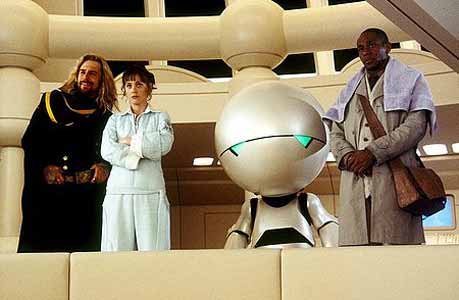 SA:
Personally, I think he'd probably be pleased. SA:
Personally, I think he'd probably be pleased.
Going back historically, obviously, the one that he was concentrating
on was getting Hitchhiker's
as a movie - which has obviously happened now.
It's
nice to see any of his products go on to the next media, and
he was always changing them
and going onto the next media, so I think he would have been
chuffed to see Dirk Gently done as well.
Darren
Rea: Did the estate have much creative input in the new Dirk
Gently
radio series.
James
Thrift: On things like this the estate, on the whole doesn't
have a creative input. Because it was being done by the same
team who did the last two Hitchhiker's, and because
Douglas had picked Dirk Maggs originally to do the last Hitchhiker's,
we had a lot of trust - in Dirk especially.
Dirk would quite often say things like: "James, I'd really
like to tweak such-and-such because I think it will work much
better for radio." He knows what he's talking about as
far as transferring it for radio, so on the whole creative
control is theirs. We trust that they won't cock it up.
Sue
Adams: James and I have been involved from the family side,
but legally we don't have any input - we're not part of the
estate. From that point of view that's really Jane his widow
who would deal with that.
From a family's point of view we have taken an interest and
we go to the recordings. We did the same with the Hitchhiker's
recordings and we are doing it now with Dirk Gently
- go along and just be part of it. We support them in doing
it. They've said that they're grateful for it because they
feel as though there's a contribution from Douglas there.
They like to know that we approve, and I think if there was
something that we really didn't like... I'm sure Dirk [Dirk
Maggs, director of the Dirk Gently radio
plays] would take it on board, but up until now we haven't
had to do that - he's done a brilliant job.
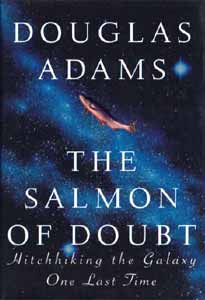 DR:
Unfortunately Douglas didn't finish the Dirk Gently
book The Salmon of Doubt before he died... DR:
Unfortunately Douglas didn't finish the Dirk Gently
book The Salmon of Doubt before he died...
JT:
[Laughs] You noticed? [Laughs]
DR:
Has that been included in the radio series?
JT:
Yes, it has. There are three series, with each having six
episodes. The first and the second book are quite easy because
it's all there. It hasn't gone unnoticed that the third one...
there isn't a book. We haven't really discussed it. It's going
to be interesting. There is an awful lot of other material.
There are ideas from The Salmon of Doubt. There is
a lot of material that can be drawn on to create a final series.
But, yes you are right, there is no complete book there.
SA:
To be perfectly honest, I've still not read the whole of The
Salmon of Doubt. Because it was produced after he died,
it's something that's on my shelf and I will admit I'll pick
it up and put it down, but I just haven't been able to read
it yet. I don't know how they'll get around that.
There's
The Long Dark Tea-Time of the Soul, which is the second
book which we've got the cut-outs of our mother. There's a
book store down here and every time mum used to go in there
she used to find it very disconcerting to see this cardboard
cut-out of her son standing there. So she used to turn it
around when she thought no one was looking. The publishers
got to hear of this, and before the release of The Long
Dark Tea-Time of the Soul they asked mum if she would
be involved in the promotion of it. So we had cardboard cut-outs
of our mother saying: "I am Douglas's Mum". She's
carrying a tray. And we had pictures from friends in Australia
saying: "Look who we've just bumped into."
She
was actually sold on eBay a few years ago. We didn't like
the thought of her going to a complete stranger, so we bought
her and she now sits in my living room. She was a bit upset
that the auction only fetched about £5.20 - she wasn't
worth an awful lot.
James
used to have one in his college rooms, but he found it very
off putting when he used to take his girlfriend back - having
his mother watching him.
DR:
How do you think Douglas would have felt about Harry Enfield
playing Dirk?
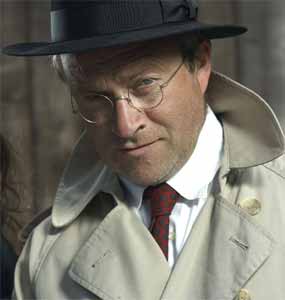 SA:
I honestly don't know. I have to admit I was surprised at
that myself to begin with and I wasn't sure what to expect
when I went up to the recording. Having been listening to
it I've warmed to it more than, perhaps, I thought I would
have done. To me personally it seemed a strange choice. I
never really talked to Douglas about Dirk Gently being
a radio show, so I honestly don't know. SA:
I honestly don't know. I have to admit I was surprised at
that myself to begin with and I wasn't sure what to expect
when I went up to the recording. Having been listening to
it I've warmed to it more than, perhaps, I thought I would
have done. To me personally it seemed a strange choice. I
never really talked to Douglas about Dirk Gently being
a radio show, so I honestly don't know.
JT:
I always remember each time the film of Hitchhiker's
was getting slightly closer to fruition. And every time we
saw Douglas we'd discuss who was suitable for different roles.
On the whole we would suggest people who we thought for a
role, and he would reel back in horror. Knowing the character
of Dirk Gently and who he was based on, Harry fits the role
rather well. I can only hope that Douglas would have approved.
DR:
How protective of his material was Douglas?
JT:
He was annoyingly protective. Every single person who has
worked with him - transferring his material into another medium
- I think most of them would agree that the period of production
was normally fairly odious.
It
was very difficult to get that information down on a piece
of paper. It was all up in his head, and even what was in
his head would evolve as time went on. So, trying to get that
across to a producer and a director, who in turn have to get
it across to sound people and cast etc., caused some friction.
There were times when they would probably lock the door and
wouldn't let him in. He very was completely hands on.
If
he were alive now he would have been there for every minute
of the recording for Dirk Gently.
DR:
It seems to be a cliché that comedy writers are generally
miserable people, that they are a disappointment when you
meet them. Was Douglas naturally funny or was it something
he had to work at? Was he the life and soul of the party,
or was he a very private man?
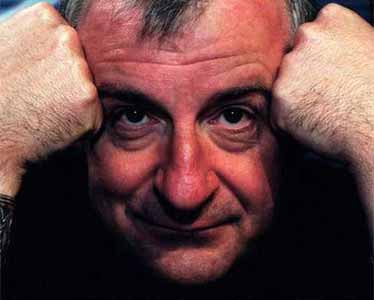 JT:
He was both really. He didn't hog the limelight for the same
of it. If it was his party you knew it was his party - and
he was the life and soul of the party. And being basically
the size he was, when he walked into the room you couldn't
help but notice him. But if he were somewhere else, where
it wasn't his gig, then he would just be there and not try
and hog the limelight. JT:
He was both really. He didn't hog the limelight for the same
of it. If it was his party you knew it was his party - and
he was the life and soul of the party. And being basically
the size he was, when he walked into the room you couldn't
help but notice him. But if he were somewhere else, where
it wasn't his gig, then he would just be there and not try
and hog the limelight.
With
a lot of comedy writers, people expect that they are going
to be performing the whole time, but they are like everyone
else. They have their on days and their off days. And that
was the same with his writing. On the whole he would do anything
than actually write. The ideas would come to him, but getting
those ideas down onto a piece of paper was torturous at times.
SA:
I remember back at boarding school I used to get these letters
from him and they were pages and pages long of absolute rubbish.
But they were great and my whole form used to really look
forward to these zany letters. That's going back to when we
were kids.
But then he's had his dark moments as well. He hasn't always
been a jolly person. He's had his trials and tribulations,
and had black moods. But basically he used to be so good to
be around.
DR:
He went through several periods where he was badly effected
by writer's block. How was he when he was going through those
times?
JT:
He had enormously long periods of time of writer's block,
and most of those times he was an absolute hoot - for the
very reason that he would always find something else to do
rather than have to write. So he would have a lot of baths,
he would go scuba diving, he'd go off and start a lot of other
projects.
The
time when the writer's block would really kick in was when
publishing deadlines were pending and editors started to get
upset with him. He was once famously locked up in a hotel
with the editor in chief sat outside the door. He wasn't allowed
out of his hotel room unless he'd written a decent amount
for the day. That's when it was best to keep away - it wasn't
nice watching him having work dragged out of him.
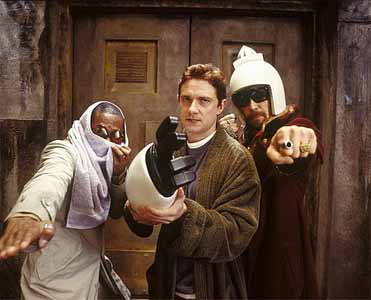 SA:
He used to write backwards. He'd start off with three pages
and end up with three words. He was so particular about what
he was writing and he wanted it to be so just right. It wasn't
always necessarily the ideas, it was how to put it all down
on paper. SA:
He used to write backwards. He'd start off with three pages
and end up with three words. He was so particular about what
he was writing and he wanted it to be so just right. It wasn't
always necessarily the ideas, it was how to put it all down
on paper.
DR:
He died before any work on the movie started for Hitchhiker's
- a project that had taken years to get the green light -
how do you think he'd feel about the irony of it starting
shortly after his death?
JT:
I'm in two minds as to whether the making of the movie is
a great honour and tribute to him, or whether it's a huge
kick in the teeth to him. As though it was: "The only
reason this movie didn't get made was because you were around."
And as soon as Douglas isn't around... oh look, a movie gets
made.
SA:
It brings to mind when our father died. Douglas had come back
from America and he'd gone straight to the hospital. I'd gone
up from Devon to the hospital, and Douglas had stayed up for
a couple of days. They
said: "You've got to get some sleep."
He'd got jet lag, so they gave him a sleeping pill.
That
night my father died. In the morning, Douglas just said: "Bloody
typical. I'm up for three days and he waits until I've got
a sleeping pill" [laughs].
So under those circumstance I think he would see the irony
of it. But I know it was something close to his heart that
he was desperate to get done.
DR:
Do you think he would have been happy with the end result?
JT:
Some bits of it, some bits that he had very distinct forthright
ideas about, I know he would have been blown away.
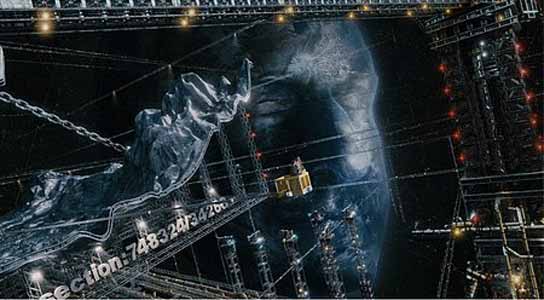 The
factory floor, where Arthur Dent and Slartibartfast first
come out on the conveyor belt, the whole visual aspect he
would have been blown away with. The
factory floor, where Arthur Dent and Slartibartfast first
come out on the conveyor belt, the whole visual aspect he
would have been blown away with.
There are other things I know that he would have rolled his
eyes at, either because what he wanted just wasn't there,
but then with the budget it just wasn't possible. There are
one or two bits of the treatment that I know he would have
queried, but on the whole a lot of the film people have made
script changes, but that was his work. Every version of Hitchhiker's
that he created differed. He almost seemed to take delight
in the fact that when another version came out it was different
from the one before.
DR:
Growing up together there was quite a large age gap. Did you
have a typical brother relationship, or was he more like an
uncle?
JT:
Definitely brother relationship. There's 15 years between
us. As a family we didn't spend a vast amount of time together,
but the time we did spend together was quality time. He wasn't
around a great deal, so it was a funny relationship, I suppose.
DR:
Where you ever the inspiration for any of his characters?
JT:
For some of the Doctor Who ones we were. He had a script
to do for The
Pirate Planet, he would come down to the dinner
table frustrated and annoyed and we'd joke about characters
and what should be in it.
Then
one day we went to the BBC to see it being filmed. We were
rather blown away to see that two specific ideas that my sister
and I had suggested were being used. There they were on set
being recorded.
One
of mine was the robot parrot, which I was tickled pink with.
I was so chuffed, that I went round the whole studio telling
everyone that basically that was my idea. But
every time I told someone, they seemed to go a bit frosty
towards me. I found out afterwards that it was because it
was a nightmare to get this robot parrot to work.
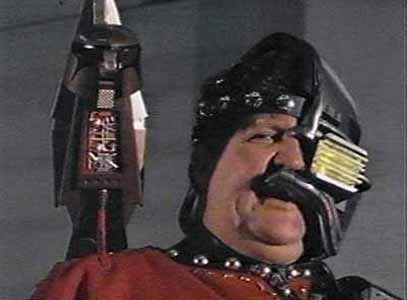 SA:
There are certainly things in there that we, as family, recognise.
Listening to Dirk Gently recently, and revisiting the
book, reminded me that he was basing it on his college rooms.
While he said that St Cedd's is fictional, I was actually
at Cambridge at the same time he was at university at Cambridge,
and when he's talking about moving around his rooms I can
visualise going around his rooms and going upstairs to the
bathroom. I know he had parties occasionally, but I never
found a white horse in the bathroom - which is part of the
plot. SA:
There are certainly things in there that we, as family, recognise.
Listening to Dirk Gently recently, and revisiting the
book, reminded me that he was basing it on his college rooms.
While he said that St Cedd's is fictional, I was actually
at Cambridge at the same time he was at university at Cambridge,
and when he's talking about moving around his rooms I can
visualise going around his rooms and going upstairs to the
bathroom. I know he had parties occasionally, but I never
found a white horse in the bathroom - which is part of the
plot.
And
there's lots of things in Hitchhiker's that we do recognise
as a family. There are quite a few of my Mother's saying that
crop up. He dedicated the first Dirk Gently book to
mum because she liked the bit about the horse.
DR:
What do you think was his proudest moment?
SA:
Personally, I think his proudest thing was when his daughter
Polly was born. Workwise... There's been so many of them -
he achieved so much.
From our point of view, and this is slightly off topic, when
Douglas died we were looking at his website and thousands
and thousands of messages were being posted by complete strangers.
It made us realise how far out he'd reached and how many people
he'd reached. I think that was an eye opener for us and that
was another stage when we were just so proud of what he had
achieved.
DR:
If he was still alive now what do you think he'd be doing?
Would he still be writing or would he be doing other things?
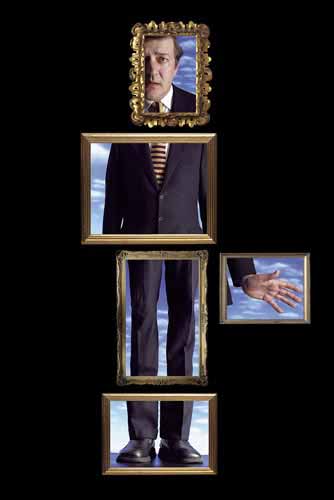 SA:
I personally think writing would always be part of his life.
But he was just so interested in technology and he was very
good at seminars and talks. SA:
I personally think writing would always be part of his life.
But he was just so interested in technology and he was very
good at seminars and talks.
We
keep thinking that it's just such a shame, with the way technology
is going - and all the gadgets - he would be having a field
day now. And it's such a shame that he didn't see some of
the modern technology that's come out since he's died. He
was a great gadget person.
DR:
If a movie were made of Douglas's life who would play Douglas
and who would play you?
JT:
Err... I know what everyone else would say - although for
the life of me I can't remember his name. The guy who used
to be in The Monarch of the Glenn, the chap who owned
the place. Who
would play Douglas? He'd probably think that John Cleese should
play him, for the simple reason that he always wanted to be
John Cleese until he realised that the job was taken. A lot
of people would probably say Stephen Fry - they were very
similar in character and demeanour.
One
of the reasons that Stephen originally started writing is
because they lived quite close to each other in Islington.
They would reconfigure each others computers for the hell
of it.
Stephen
turned up at Douglas house one day to be met by Sue Freestone,
Douglas's editor. She told Stephen that he was forbidden to
go up to the study because Douglas was working. If he wanted
to, he could sit in the kitchen and wait. And every now and
again Douglas would come down the stairs and hand over a page
like a little school boy in detention. Stephen got chatting
to Sue, who told him that he could do this, he could write
a book.
So
Stephen went away and thought about it, and three weeks later
came back with a book, which p*ssed Douglas off no end.
In
a way Stephen is actually taking on the role of Douglas, because
we're planning on making a television series based on Last
Chance to See, the book that Douglas wrote about going
off around the world looking for virtually extinct animals.
This was originally a radio series with Douglas and Mark Carwardine,
and the TV series will have Stephen taking Douglas's role.
But that's not due out until at least October 2009.
DR:
Thank you for your time.
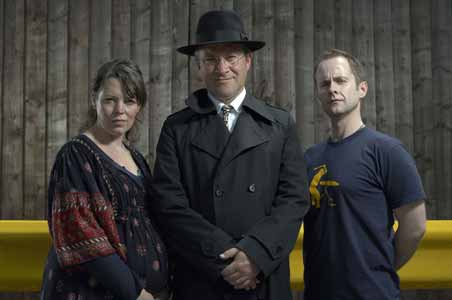
With
thanks to Lee Leschasin at BBC Audio
Dirk
Gently's Holistic Detective Agency begins
broadcasting on Radio 4 from 03 October 2007. It is also available
to buy on CD from BBC
Audio
from 08 November 2007.
Click
here
to buy Dirk Gently's Holistic Detective Agency on CD
for £15.19
These
interviews were conducted on 05 September 2007
Return
to...

|